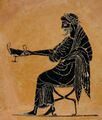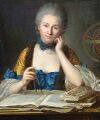Template:Selected anniversaries/December 17: Difference between revisions
No edit summary |
No edit summary |
||
| Line 1: | Line 1: | ||
<gallery | <gallery> | ||
File:Dionysos kantharos.jpg|link=Dionysus (nonfiction)|500 BC: [[Dionysus (nonfiction)|Dionysus]] gives speech which anticipates the coming of [[Saturnalia (nonfiction)|Saturnalia]]. | File:Dionysos kantharos.jpg|link=Dionysus (nonfiction)|500 BC: [[Dionysus (nonfiction)|Dionysus]] gives speech which anticipates the coming of [[Saturnalia (nonfiction)|Saturnalia]]. | ||
File:Saturnus.jpg|link=Saturnalia (nonfiction)|497 BC: The first [[Saturnalia (nonfiction)|Saturnalia festival]] celebrated in ancient Rome. | File:Saturnus.jpg|link=Saturnalia (nonfiction)|497 BC: The first [[Saturnalia (nonfiction)|Saturnalia festival]] celebrated in ancient Rome. | ||
| Line 6: | Line 6: | ||
File:John Venn computing diagram.jpg|link=John Venn (nonfiction)|1855: Set theorist and crime-fighter [[John Venn]] devotes himself to fighting [[crimes against mathematical constants]]. | File:John Venn computing diagram.jpg|link=John Venn (nonfiction)|1855: Set theorist and crime-fighter [[John Venn]] devotes himself to fighting [[crimes against mathematical constants]]. | ||
File:Dame Mary Lucy Cartwright.jpg|link=Mary Cartwright (nonfiction)|1900: Mathematician and academic [[Mary Cartwright (nonfiction)|Mary Cartwright]] born. She will do pioneering work in what will later be called [[Chaos theory (nonfiction)|chaos theory]]. | File:Dame Mary Lucy Cartwright.jpg|link=Mary Cartwright (nonfiction)|1900: Mathematician and academic [[Mary Cartwright (nonfiction)|Mary Cartwright]] born. She will do pioneering work in what will later be called [[Chaos theory (nonfiction)|chaos theory]]. | ||
File:Lord Kelvin by Hubert von Herkomer.jpg|link=William Thomson, 1st Baron Kelvin (nonfiction)|1907: [[William Thomson, 1st Baron Kelvin (nonfiction)|Lord Kelvin]] dies. He did much to unify the emerging discipline of physics in its modern form. | |||
File:Cherenkov high-energy literature test reactor.jpg|link=High-energy literature|1977: [[High-energy literature]] used during [[Saturnalia (nonfiction)|Saturnalia]] for the first time. | File:Cherenkov high-energy literature test reactor.jpg|link=High-energy literature|1977: [[High-energy literature]] used during [[Saturnalia (nonfiction)|Saturnalia]] for the first time. | ||
File:HAL9000.svg|link=HAL 9000|2004: [[HAL 9000]] blames "inherent perversity of [[Saturnalia (nonfiction)|Saturnalia]]" for death of crew and passengers. | File:HAL9000.svg|link=HAL 9000|2004: [[HAL 9000]] blames "inherent perversity of [[Saturnalia (nonfiction)|Saturnalia]]" for death of crew and passengers. | ||
Revision as of 16:16, 19 March 2017
500 BC: Dionysus gives speech which anticipates the coming of Saturnalia.
497 BC: The first Saturnalia festival celebrated in ancient Rome.
951: Astronomer Abd al-Rahman al-Sufi invents new form of scrying engine.
1706: Mathematician and physicist Émilie du Châtelet born. She will translate and comment upon on Isaac Newton's Principia Mathematica.
1855: Set theorist and crime-fighter John Venn devotes himself to fighting crimes against mathematical constants.
1900: Mathematician and academic Mary Cartwright born. She will do pioneering work in what will later be called chaos theory.
1907: Lord Kelvin dies. He did much to unify the emerging discipline of physics in its modern form.
1977: High-energy literature used during Saturnalia for the first time.
2004: HAL 9000 blames "inherent perversity of Saturnalia" for death of crew and passengers.
1790 – Discovery of the Aztec calendar stone.
1903 – The Wright brothers make the first controlled powered, heavier-than-air flight in the Wright Flyer at Kitty Hawk, North Carolina.
1938 – Otto Hahn discovers the nuclear fission of the heavy element uranium, the scientific and technological basis of nuclear energy.
1969 – Project Blue Book: The United States Air Force closes its study of UFOs.
1778 – Humphry Davy, English chemist and physicist (d. 1829)
1797 – Joseph Henry, American physicist and engineer (d. 1878)








